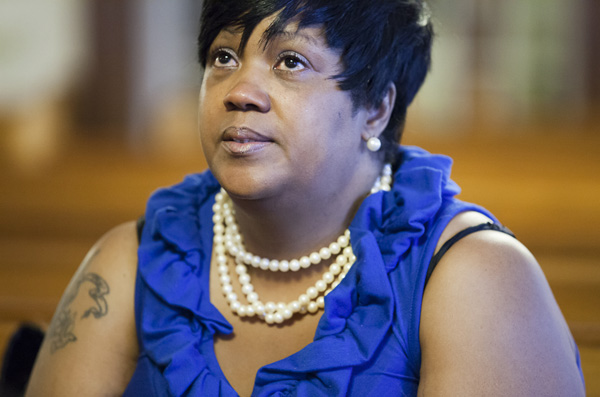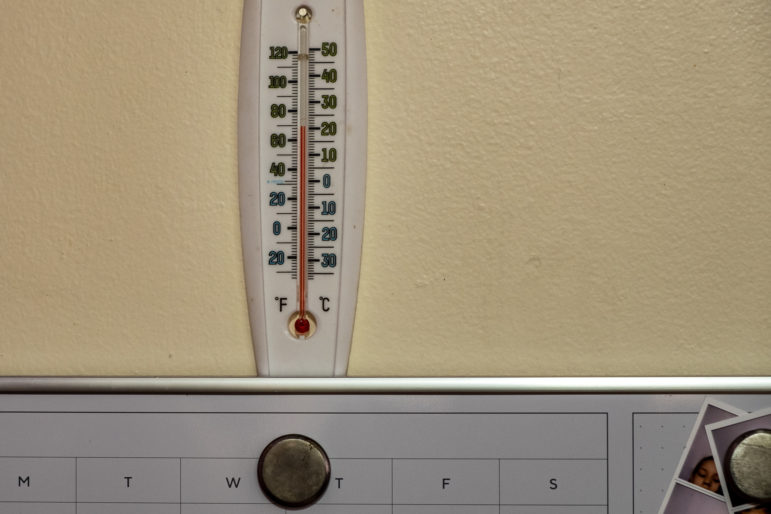
Photo by: Marc Fader
Francena Brown lost her son to gun violence five years ago. Since then she’s worked with an advocacy group called AWAKE to help other victims of gun violence, including family members she meets when one of the group’s response teams is called to the emergency room at Bay State Medical Center to counsel families and friends after a violent incident. “It got numb to the point where it didn’t even bother me,” she says.
Springfield, Mass. has more than one claim to fame. The game of basketball was invented by a local college professor in a college gymnasium at the corner of State and Sherman streets in 1891, and the National Basketball Hall of Fame anchors the city’s Connecticut River waterfront. Dr. Suess grew up here: His book “If I Ran the Zoo” was likely inspired by his father’s job as head of the zoo in Forest Park. And even though Matt Groening claims a different Springfield is the setting for his long-running prime-time TV show, many locals insist that their Springfield is the true location for “The Simpsons.”
But this city of 150,000, known as the City of Homes for its abundance of stately houses, is inextricably linked to America’s gun industry. The Springfield National Armory off Federal Street, now a National Park Service site, is where large-scale gun-making began in earnest on the American continent. While the armory stopped producing guns in 1968, the Smith & Wesson factory a few miles away continues to churn them out—manufacturing more than half a million pistols and revolvers in 2009. The company employees some 1,200 people, making it a major player in a city that lost 40 percent of its manufacturing jobs between 1985 and 2000. In 2010, calling Smith & Wesson “a globally recognized manufacturer of quality firearms for safety, security, protection and sport,” the state gave the company a $6 million tax break in exchange for moving 225 jobs from New Hampshire to Springfield.
But Springfield is also no stranger to the human impact of guns. The town recorded 20 murders last year—good for a murder rate twice as high as New York City’s.
Natives Chelan and DeJuan Brown, a married couple with four children, helped to start an anti-violence group called AWAKE eight years ago. Since then, they haven’t had to look far to feel the effects of gun bloodshed. One of the other founders, a mayoral aide named Stephen Pegram, was shot dead in 2005 by a serial killer. A mother that the group has worked with buried one twin and then another to gun violence within a six-week period.
Another member, Jessica Negron, had a 23-year-old son named Darren who had dealt drugs in the past but was trying to get his life in order after a few run-ins with the law. He sometimes carried a gun; his mother found this out when she tried to mediate a dispute between Darren and another guy who said he was afraid Darren would shoot him. But he was apparently not carrying the gun when he visited an illegal liquor store on a January night in 2011. He was shot once and died. Afterwards, Jessica says, “I went into the basement and I did find a gun, but it was all broken up.” More recently one of Negron’s nephews was shot in front of his house, presumably by members of a gang who believed his family was involved in a 2009 shooting at a McDonalds where a man was killed and a 12-year-old wounded.
Francena Brown, who is not related to Chelan and DeJuan, lost her son five years ago. He was on his way to a graduation party when someone in a passing car shot him in the head. Since then she’s worked with Awake to help other victims of gun violence, including family members she meets when one of the group’s response teams is called to the emergency room at Bay State Medical Center to counsel families and friends after a violent incident. “It got numb to the point where it didn’t even bother me,” she says.
What proportion of suicides and homicides involve guns?
While the killer of Ms. Brown’s son has not been caught, Brown does know he was shot with a 9mm. Which manufacturer made the gun is not known. Indeed, it’s impossible to say how many gun crimes in Springfield or anywhere else involve a particular make or model of gun, although the Smith & Wesson .38 has traditionally been among the top 10 crime guns in the country. (Smith & Wesson declined to comment for this story.)
Members of AWAKE believe that guns purchased legally are then sold to criminals in Springfield. Local law enforcement records reflect other ways guns get into the wrong hands: The local U.S. attorney earlier this year prosecuted a Worcester man for stealing 50 guns from a sporting goods story. Springfield’s City Council is considering a proposal to establish a gun court and a special police gun squad and give cops wider powers to seize vehicles in which illegal weapons are found. A proposed Massachusetts law restricting gun owners to one purchase per month died in July amid opposition from local gun-rights activists.
A few years ago, Chelan Brown helped to facilitate the arrest of a violent criminal and believed he intended to kill her in retaliation (he later admitted he might have). So she got a permit to carry a firearm and bought a gun. But she notes, with displeasure, that no one has ever checked to see whether she still has it.
“There’s no accountability,” says DeJuan. “It’s crazy.”
Read our coverage of the effect of gun politics on the gun industry at The Nation. Research assistance for this project was provided by Arielle Concilio.







